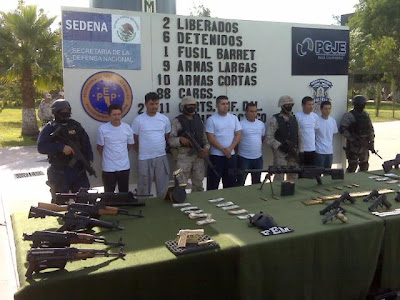 |
| Jesús Zambada Reyes |
A leading suspect who belonged to the Sinaloa Cartel and provided information to the government was found dead of an apparent suicide, officials said Saturday.
In the case of the informant the Attorney General's Office (PGR) reported that Jesus Zambada Reyes, identified as the nephew of the cartel leader Ismael "El Mayo" Zambada, was found dead from asphyxiation in Mexico City.
The PGR said Zambada Reyes was found hanging with a shoelace on Friday and that all evidence indicates that it was a suicide. PGR officials say they will continue to investigate the death.
Prosecutors said in a statement that Zambada Reyes was a "contributing witness", but did not specify whether he was in protective custody or whether he was part of a witness protection program.
Zambada Reyes ranked as one of the main operators of the Sinaloa Cartel when he was
arrested in October 2008. He allegedly was involved in trafficking cocaine and methamphetamine through the international airport of Mexico City.
Rambo 3
Jesus Zambada Reyes, nephew of Ismael El Mayo Zambada and a protected witness of the PGR reportedly had expressed his desire to commit suicide, according to initial investigations that have been carried out about his death on Friday night.
The Attorney General of the Federal District (PGJDF) assumed full control of the investigation into the circumstances of the death of the son of Jesus Zambada Garcia, El Rey, who was arrested in October last year.
The death occurred inside a house that was owned by the late drug lord Amado Carrillo Fuentes, El Señor de los Cielos (the Lord of the Heavens), located in the street Xitle 87 in the neighborhood of Santa Ursula. At that scene, which was guarded on a permanent basis 24 hours, 7 day a week by federal agents found Zambada Reyes, identified by a secret code of "Rambo 3," hanging.
Reports from the Attorney General's Office indicate that the body of the son of "El Rey" Zambada showed no signs of struggle and it it was learned that in the past he had expressed a desire to die.
"Rambo 3," which is a code given to Zambada Reyes, helped to capture and identify criminals who maintained ties with the Sinaloa cartel.
Zambada Reyes’s uncle, Ismael, is one of the most-wanted drug traffickers in Mexico.
Mexico’s most powerful drug trafficking organizations, according to experts, are the Tijuana cartel, which is run by the Arellano Felix family, and the Gulf, Juarez and Sinaloa cartels.
Two other large drug trafficking organizations, the Colima and Milenio cartels, also operate in the country.
“Los Zetas,” a group of army special forces veterans and deserters who initially worked as hitmen for the Gulf organization, may now be operating as a cartel, some experts say.
La Familia Michoacana, which operates in the western state of Michoacan, the southern state of Guerrero and the central state of Mexico, which surrounds the Federal District and forms part of the Mexico City metropolitan area, is considered the largest trafficker of synthetic drugs in Mexico.
The Sinaloa organization is the oldest cartel in Mexico and is led by Guzman, who was arrested in Guatemala in 1993 and pulled off a Hollywood-style jailbreak when he escaped from the Puente Grande maximum-security prison in the western state of Jalisco on Jan. 19, 2001.
Guzman, considered extremely violent, is one of the most-wanted criminals in Mexico and the United States, where the Drug Enforcement Administration has offered a reward of $5 million for him.
El Chapo made the Forbes list of wealthiest people in the world this year, ranking 700th with an estimated fortune of $1 billion.



























































